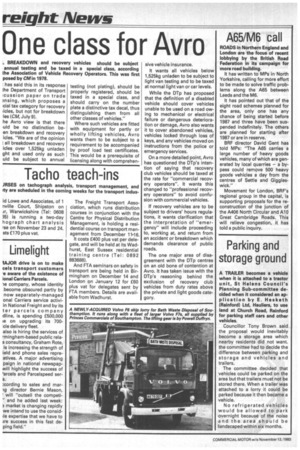One class for Avro
Page 16

If you've noticed an error in this article please click here to report it so we can fix it.
_ BREAKDOWN and recovery vehicles should be subject annual testing and be taxed in a special class, according the Association of Vehicle Recovery Operators. This was first posed by CM in 1978.
has said this in its response the Department of Transport ;cussion paper on trade )nsing, which proposes a cial tax category for recovery ides, but not for breakdown ies (CM, July 9).
he Avro view is that there uld be no distinction been breakdown and recovery ides. "We are of the opinion : all breakdown and recovery icles over 1,525kg unladen ght and used only as such uld be subject to annual testing (not plating), should be properly registered, should be taxed in a special class, and should carry on the number plate a distinctive tax decal, thus distinguishing them from all other classes of vehicles."
Where such vehicles are fitted with equipment for partly or wholly lifting vehicles, Avro wants them to be subject to a requirement to be accompanied by proof load test certificates. This would be a prerequisite of licensing along with comprehen sive vehicle insurance.
It wants all vehicles below 1,525kg unladen to be subject to light van testing and to be taxed at normal light van or car levels.
While the DTp has proposed that the definition of a disabled vehicle should cover vehicles unable to be used on a road owing to mechanical or electrical failure or dangerous deterioration or damage, Avro also wants it to cover abandoned vehicles, vehicles locked through loss of keys, and any vehicles moved on instructions from the police or emergency services.
On a more detailed point, Avro has questioned the DTp's intention of saying that recovery club vehicles should be taxed at the rate for "commercial recovery operators". It wants this changed to "professional recovery operators" to avoid confusion with commercial vehicles.
If recovery vehicles are to be subject to drivers' hours regulations, it wants clarification that the interpretation of "emergency" will include proceeding to, working at, and return from an accident or breakdown which demands clearance of public roads.
The one major area of disagreement with the DTp centres on an old bone of contention at Avro. It has taken issue with the DTp's reasoning behind the exclusion of recovery club vehicles from duty rates above the private and light goods category.








































































































































































